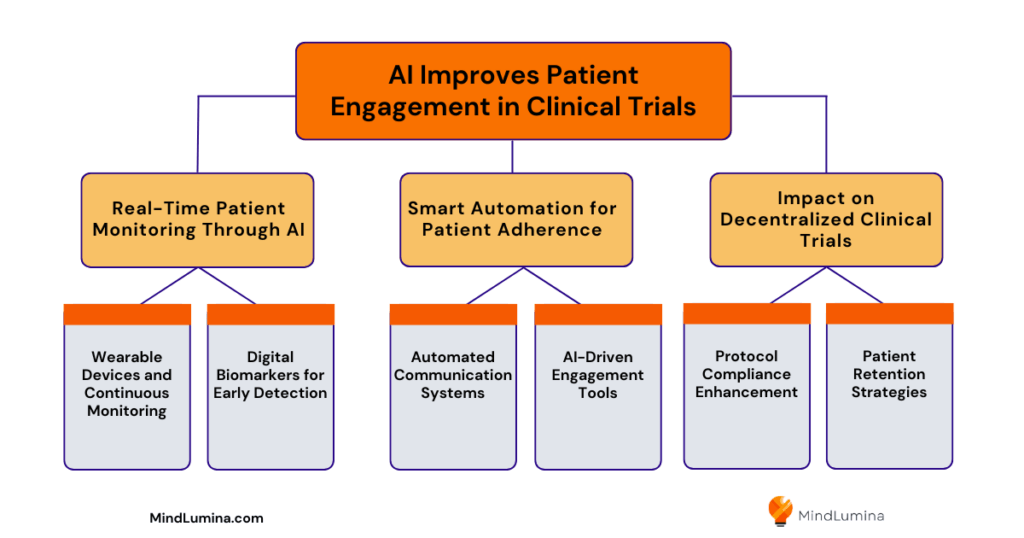Artificial intelligence (AI) is improving patient engagement in clinical trials through enhanced monitoring capabilities, smart automation, and personalized strategies in decentralized clinical trials.
Real-Time Patient Monitoring Through AI
Wearable Devices and Continuous Monitoring
AI-powered wearables and sensors enable continuous, real-time monitoring of patient health status without requiring frequent in-person visits. These devices track vital signs, activity levels, sleep patterns, and other health indicators, providing a constant stream of real-time data. As a result, research teams have enhanced visibility into patient well-being and trial progress.
Digital Biomarkers for Early Detection
Digital biomarkers have advanced how researchers monitor patient participation and health status. AI systems analyze various data points to identify signs of potential issues before they become serious problems. This predictive capability allows research teams to intervene proactively, ensuring patient safety and maintaining trial integrity.
Smart Automation for Patient Adherence
Automated Communication Systems
Modern clinical trials leverage AI to maintain consistent patient engagement through:
- Automated alerts and reminders for medication dosing
- Smart scheduling systems for appointments
- Intelligent two-way messaging platforms for immediate response to patient concerns
- Personalized communication timing based on patient behavior patterns
AI-Driven Engagement Tools
The advanced capabilities of modern AI engagement tools in clinical trials are clearly demonstrated by the AiCure platform and AllazoHealth.
The AiCure platform conducts comprehensive analysis of facial expressions to monitor emotional and physical well-being indicators, while simultaneously tracking body movements to assess medication adherence. Through voice pattern analysis, the platform can also identify potential adverse events or signs of participant distress, providing research teams with early warning signals for intervention.
AllazoHealth takes a complementary approach to patient engagement by conducting deep analysis of patient datasets, including prescription records, medical claims, and behavioral patterns. The platform’s sophisticated algorithms determine the optimal timing for patient communications and identify the most effective message formats for each individual. By analyzing historical patient behavior and response patterns, AllazoHealth helps researchers select the most appropriate delivery channels and create personalized content strategies that truly resonate with each participant. This tailored approach ensures that trial-related communications remain informative, engaging, and motivating throughout the study duration.
Impact on Decentralized Clinical Trials
Protocol Compliance Enhancement
AI technology has become especially important in decentralized clinical trials, where remote participation presents unique challenges for maintaining protocol compliance. These technologies offer personalized approaches with less disruption that enable participants to engage in studies from home while ensuring clinical trial data quality remains high. Through automated monitoring systems, research teams can track compliance without requiring frequent site visits, significantly reducing the burden on participants while maintaining rigorous protocol standards. The real-time feedback on protocol adherence allows for immediate adjustments and interventions when needed, ensuring study integrity throughout the trial duration.
Patient Retention Strategies
The implementation of AI-powered retention strategies has shown remarkable success in maintaining participant engagement and improving patient outcomes in decentralized trials. By continuously monitoring engagement levels, these systems can identify early warning signs of potential dropout risk, allowing research teams to intervene before issues escalate. The use of AI creates a more convenient trial experience by allowing more flexibility in participants’ daily lives while maintaining consistent, meaningful communication throughout the study period. This balanced approach to participant engagement has demonstrated significant improvements in retention rates, particularly in longer-term studies where traditional retention methods often struggle.
These AI-powered approaches are making trial participation more accessible and manageable for patients while ensuring high-quality data collection for research teams. Moreover, the integration of these AI applications is improving how patients engage with clinical trials, leading to better experiences and more successful research outcomes.



